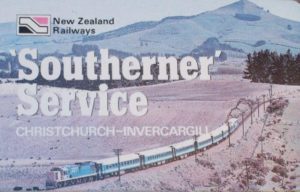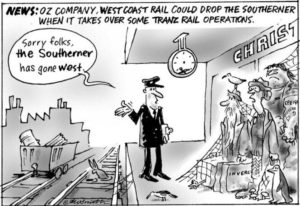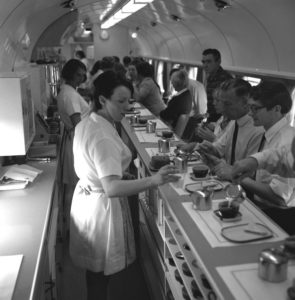1970: The Southerner
December 1, 2020
By AHNZ
 Today in New Zealand history, 1 December, 1970, The Southerner opened for business. The Southerner, between 1970 and 2002, was a passenger express train, Christchurch to Invercargill. In particular, this marked the ending of steam-powered trains being relied upon in New Zealand. Steam was out, diesel was in!
Today in New Zealand history, 1 December, 1970, The Southerner opened for business. The Southerner, between 1970 and 2002, was a passenger express train, Christchurch to Invercargill. In particular, this marked the ending of steam-powered trains being relied upon in New Zealand. Steam was out, diesel was in!
“Perhaps the real symbol of Christchurch is the railway station, pretentious and monolithic, yet with only about half a dozen trains a day that go anywhere beyond Christchurch suburbs, and only the ‘Southerner’ that really goes at all. This train provides the best view of Christchurch.”- Austin Mitchell (being a smart arse)
Initially, The Southerner was a success. The competition from plains and automobiles was yet to arise in 1970. A bus service might have been competition sooner but New Zealand Rail controlled those too so that kept that rival at bay.
Apart from, at last, bringing New Zealand out of the Age of Steam, The Southerner brought luxury and food back to its segment of the Main Trunk Line. Since World War 1 dining cars had been outlawed as an ‘economy measure’ by The State yet it took until now for them to return. The late 1960s/early 1970s were a hopeful, energetic, optimistic time. It was not a time to conform to cruddy old Great War steam-powered hospitality levels either. Rather than have to slow the trip with various 10 min dashes for a up of tea and a pie from stops along the way (Clinton, Ashburton, Timaru, Oamaru, Palmerston, Gore, Dunedin) The Southerner had its own dining car.
“Old first class cars built in the 1930s and 40s, were spruced up with luxuries like carpet, electric heating and, lo and behold, a buffet car was introduced offering full meal service, and many intermediate stops were removed, so the service would approach being competitive with driving. It was a success for some years, but only because the distances between the main centres were shorter than the North Island Main Trunk. Yet it too would fall by the wayside because of economics. Cars that weighed three times as much as a bus and carry 30% fewer passengers, buffet cars lost a fortune. Ultimately, the Southerner ended in 2002 because a combination of widespread car ownership and low cost efficient shuttle bus services saw it seen as a slow, lumbering and expensive way to get around.”- Liberty Scott
 The old 1930s/40s first class cars may sound like a cheap Number Eight Wire retrofit but actually it worked well, they were very comfortable¹.
The old 1930s/40s first class cars may sound like a cheap Number Eight Wire retrofit but actually it worked well, they were very comfortable¹.
Not until the 1980s did the rail cars become quite few and The Southerner change from being a valuable modern transporter to a subsidised White Elephant on tracks.
In 1993 The Southerner, along with all of New Zealand Rail, was privatised in what was soon named Tranz Rail. In turn, Tranz Rail sold off The Southerner and other lines to other private companies. The Southerner went to West Coast Railway (WCR.)
“Tranz Rail’s move to rid itself of passengers is about to get its first big shunt, with tenders closing tomorrow for its long-distance train services. As many as 10 overseas and domestic companies are understood to be interested in buying the eight Tranz Scenic services, which are being offered in one package by Tranz Rail….. package includes the daily Northerner and Overlander services between Wellington and Auckland, the Wellington-Napier Bay Express, the Auckland-Tauranga Kaimai Express, the Geyserland to Rotorua, the Southerner main trunk service between Christchurch and Invercargill, the Tranz Coastal between Picton and Christchurch, and the Tranz Alpine from Christchurch to the West Coast.”- The Evening Post (2001); Massey.ac.nz
“Public outcry failed to save the train, and the last services ran on Sunday, 10 February 2002. The carriages were re-allocated to the TranzAlpine between Christchurch and Greymouth and the TranzCoastal between Christchurch and Picton. Invercargill lost its status as the southernmost passenger station in the world.”- Southerner, Wiki
The WCR was an Australian firm that rose to gobble up similar privatisations occurring in Victoria in the same year, 2001². They promptly shut down and consolidated/liquidated their New Zealand property in 2002.
Anarchists, or even regular Statist Kiwis (with an above average IQ,) might well wonder what giant con all of this had been? Our Government managed to hand over assets confiscated from and funded by stolen tax money of generations for a song. The purchasing companies then vivisected and on-sold those rail assets for impressive profits! Rather than attributing this great money laundering to the reality of politics and corruption in our country most people prefer to simply think mistakes were made or that the Ministers in charge were crazy. Yeah sure. Crazy like a fox! At your loss.
—
1 According to my rail-enthusiast neighbour who knows The Southerner very well; AHNZ Archives (2020)
2 Why an east-Australian railway interest called itself “West Coast Railway” is a mystery to me…
Image ref. Smith; Shipping Gazette (2001); Alexander Turnbull Library
Ref. Trans Rail news; Massey.ac.nz
Ref. The Half-Gallon Quarter-Acre Pavlova Paradise, Austin Mitchell (1972)
Ref. Farewell Air NZ 737s – the noisy revolutionaries, Liberty Scott (2015)
Image ref. The Southerner Buffet car, Nov 1970 (trial run); NZ History.gov
Ref. West Coast Railway (Victoria); Wiki
Ref. also 1985: GMV Wairua
Ref. also 1982: Operation Freightcare
5 thoughts on "1970: The Southerner"
Leave a Reply
 Like Comment Share
Like Comment Share







Comments should be working on these posts now. Am I right?
That comment did not appear; Will this?
Now we’re onto it.
Entering comment with a website entry non-blank (http://nzb3.anarkiwi.co.nz/2020/11/21/beyond-learned-helplessness/)
Pretending to be someone else and including a website entry (lindsaymitchell.blogspot.com)